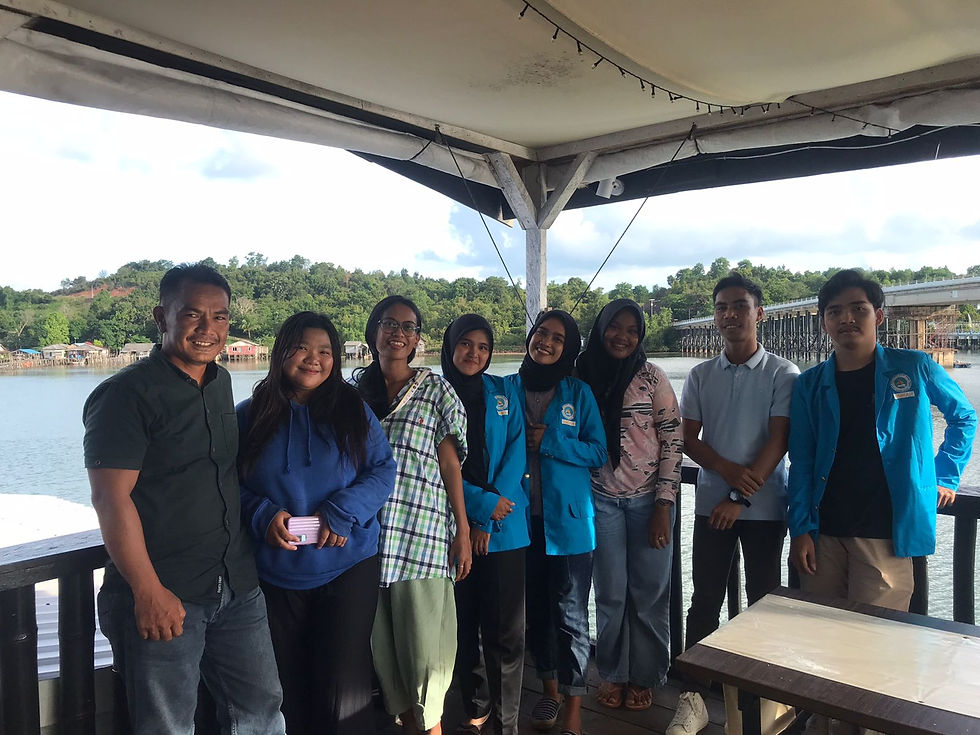Empowering Local Youth through Collaborative Internship: Joint Effort for Coastal Conservation
- Maria Fryna Angelica Andris

- Feb 3, 2023
- 3 min read
Updated: Mar 24, 2023

In August 2022, CarbonEthics held an internship program with the Sociology Study Program of Universitas Maritim Raja Ali Haji (UMRAH) in Riau Islands. This collaborative program took place in one of CarbonEthics’ conservation sites in Dompak island, Bintan, Riau Islands. For thirty days, the four selected students - Jasri Fanny Humairah, Novi Gabriella Haria, Delsy Arya Putri, and M. Apriansyah Daulay - took a closer look at the working process of coastal communities on conserving nature. Through this internship program, CarbonEthics aimed to empower young people and build resilient local communities.
Empowering Local Youth
According to UNESCO, climate change education plays a crucial role for students to understand and address the impacts of climate change, empowering them with the knowledge, skills, values, and attitudes needed to act as agents of change. Seeing the vital role of education, throughout the internship, the four students embarked on a journey to learn about climate knowledge that would later be translated into climate actions.
The Community Development team of CarbonEthics guided the students to various impactful activities. First, learning about Blue Carbon Education & Climate Change Mitigation through Carbon Voice Curriculum (CVC). Next, they participated in a virtual leadership mentoring session from CarbonEthics Leaders Team. The mentoring session aimed to teach the students how to grow and transform into the best version of themselves. Also, this session included a lesson to implement the principles of conservation leadership - a set of guiding principles for young leaders like the students to address conservation issues at local, regional, and global scales. With this, the students acquired a new set of leadership skills that inspire collaborations and generate impacts to the people and the planet.
Building Resilient Coastal Communities
A two-way learning between the students and coastal communities has been implemented during this internship as a way to highlight the importance of climate education as an essential foundation for tackling climate change. After learning about climate knowledge from the CarbonEthics team, the students got the opportunity to implement climate knowledge by mentoring and facilitating community development activities. The students participated in strengthening the capacity building of the coastal farmers through blue carbon education. They elaborated about the mechanism of blue carbon sequestration, and the ecological and economic function of mangrove & seagrass education. This knowledge session helped to expand the farmers’ knowledge and comprehension of their conservation practices. Furthermore, the session valued the work of the coastal farmers by acknowledging and encouraging their vital role as the front liners to heal and restore nature.


Aside from gaining climate knowledge, the coastal communities took part in giving practical climate knowledge to the students by showing their working process on the field and the making of batik using mangrove dead barks.
Through practical and theoretical learning experiences, both the students and coastal communities deepened their knowledge and hearts to restore climate balance.
Supporting Conservation Projects through Scientific Research
Within this internship period, the students had the responsibility to conduct and collect research data on the field for their scientific writings. Their main ideas revolved around local communities and mangrove conservation that later developed into interesting research topics: “The Effectiveness of Women Leadership in Farmers Group,” “The Management of Mangrove Plantation by CarbonEthics and Local Stakeholders,” and “The Potential Of Ecotourism On Dompak Island.”
The scientific writing project reflects CarbonEthics' support for incorporating scientific research as the basis for conservation, restoration, and management of nature and its biodiversity. Their research publications support conservation efforts by providing accessible and accurate information, identifying root causes, and providing theoretical and analytical tools for presenting technical suggestions to nature management.
The short period of the internship program produced positive long-term impacts on the people and planet. To the people, this program empowers youth in climate action, builds resilient local communities, and provides open data for science and social research in Dompak Island. To the planet, this program becomes a medium for coastal farmers to showcase how they decelerate the climate crisis through community-based conservation models, restore climate balance with nature-based climate solutions, and cultivate mangrove parts as sustainable products like soap, coffee, and batik cloth.
With this internship program, the young scholars could learn closely the work of environmental organizations like CarbonEthics in preparing a resilient, sustainable future and empower them as local agents of change to prepare for a sustainable future.
About CarbonEthics
CarbonEthics is an organization that aims to restore the climate balance through nature-based solutions with pioneers in blue carbon conservation. When you conserve with CarbonEthics, you are not only creating positive environmental change, but you are advancing social impact by directly enhancing the livelihoods of our local community partners.
Instagram: @CarbonEthics
LinkedIn: CarbonEthics
Email: hello@cabonethics.org
Website: www.carbonethics.org




Mit unserem Notenrechner kannst du schnell und einfach deine Leistungen analysieren und gleichzeitig deinen Notendurchschnitt berechnen – ideal für Schüler, Lehrer und Studenten, die jederzeit den Überblick behalten wollen.
Where to claim Coin Master spins safely – A secure, trusted source for all your daily free spins and rewards.
Descubra facilmente qual é a solução do Wordle português hoje e compartilhe com amigos.
Check innovation trends curated by DualMedia News for insights into breakthrough technologies and future-focused ideas.
Calculate grades online for free using an easy, web-based calculator — no registration required.